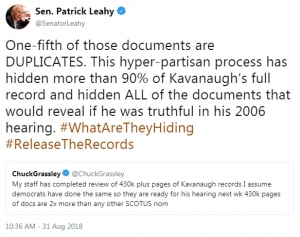Alito Versus Law And Science
Our legal system only works if we have impartial judges whose decisions are based on facts. Samuel Alito is not an impartial jurist. He doesn’t care about facts. In this, he is only the most obvious of the six right-wing members of SCOTUS.
Law
Roe v. Wade, discussed here, stood as precedent for 50 years, until it was thrown out by the right-wingers. Each of the people who signed onto the opinion, and John Robert, who didn’t, swore that stare decisis is a crucial aspect of judicial legitimacy, and recognized that Roe was binding precedent. That was a deception.
One important goal of stare decisis is to create certainty and stability in social relations. The legal term is reliance. We don’t overturn precedent without good cause. We might overturn a precedent because it is doing more harm than good. Thus, reasonable people see the wisdom in overturning Plessy v. Ferguson, which upheld Jim Crow laws.
I do not think Roe v. Wade was wrongly decided, but even if I did, that’s not enough. If overturning it causes more harm than leaving it in place, it should stand. Otherwise, we are not a government of laws, but a government by the feelings of five members of SCOTUS.
In Dobbs v. Jackson Women’s Health Organization, Alito rips that principle to shreds in pursuit of his partisan ideology. He writes:
in this case, five factors weigh strongly in favor of overruling Roe and Casey: the nature of their error, the quality of their reasoning, the “workability” of the rules they imposed on the country, their disruptive effect on other areas of the law, and the absence of concrete reliance.
His justification for all these points is callous and absurd, but especially his rejection of reliance. In § III.E he explains that there are three kinds of reliance.
1. Areas of law requiring precise advance planning. This, of course, is not applicable.
2. Areas of concrete reliance. That’s not present in this case. The claims that women rely on Roe are “novel” and “intangible”, and it would be wrong to consider them.
That form of reliance depends on an empirical question that is hard for anyone—and in particular, for a court—to assess, namely, the effect of the abortion right on society and in particular on the lives of women.
That leads to impassioned arguments, he says, so who’s to say whether there’s any actual reliance. So what if there’s a hideous impact is on society and in particular on the lives of women? Those things are irrelevant in the austere legal world, lit by the incandescent power of the Judicial Intellect Of Sam Alito.
3. This ruling won’t affect other cases. He must think we’re stupid.
Science
Alito uses the term “unborn human being” ten times in his opinion. Usually courts use neutral language, or the language of the parties. His choice of words is a signal about his beliefs. He thinks a human child, a separate person, is living in the womb, just waiting to be born. That’s not true. It’s a religious belief.
My thanks to commenter c-i-v-i-l for linking us to a peer-reviewed paper in Natural Sciences, Pseudo-embryology and personhood: How embryological pseudoscience helps structure the American abortion debate. The paper was written by a noted US embryologist, Scott Gilbert. I have the pleasure of knowing Professor Gilbert. The paper includes a review and explanation of six of the different views scientists hold regarding the onset of personhood.
1. Fertilization: the formation of a unique genome.
2. Gastrulation: the point of cellular division of the fertilized ovum at which the embryo can no longer form identical twins, but can only form one unique human person.
3. Emergence of the human EEG pattern pattern: the cerebral cortex begins to function.
4. Viability: the stage at which the embryo can survive outside the womb.
5. Birth.
In addition to these, Gilbert notes a sixth position taken by many scientists, that personhood is not a scientific category. The differences he describes between the state of the embryo at the five stages he lists show the problem.
Gilbert’s paper disposes of the notion that there is scientific consensus on the issue of personhood. He goes much farther in his analysis, explaining that the anti-abortion mob is creating a pseudo-science to justify their religious zealotry. He likens it to Eugenics which caused tremendous damage; it also seems like creationism.
He describes three myths that buttress this pseudo-science. One is th myth of the valiant sperm fighting its way on a perilous journey, racing to the waiting ovum, piercing it and filling it with new life. This is a story of masculine prowess: the male is the active force and the female is passive. It’s the myth of the journey of the hero as seen in the work of Joseph Campbell and others. He writes:
The female oviduct is not a passive racetrack, and the egg and its cumulus are active in attracting sperm and exciting them to swim faster. Although the sperm needs its propulsion to pass through the cumulus cells and extracellular covering that surround the egg, it does not bore through, drill through, or penetrate the egg, itself. Rather, when the sperm finds the egg, it lies next to it, spooning, and then the membranes of the sperm and egg melt together, and the two become one.
This is a beautiful and powerful picture: two human bodies working together to achieve new life. Alito deals with the beauty and complexity Gilbert outlines in his paper by claiming judges can’t solve the problem. His solution is to hand the decision to state governments. He knows full well that many of them don’t care about reality any more than he does, and that they will take away the liberty of the majority. He doesn’t care.
Partisan hackery
It’s easy to see that Alito is a partisan hack by reading his opinions and checking his voting record. In the face of his record, he refused to recuse from the Trump immunity case and the January 6 criminal case on the hilarious grounds that no one could think him anything but the soul of impartiality.
Journalist Lauren Windsor recorded Alito at a recent private event. The video reinforces the perception that he is a partisan, not an impartial judge. He has a Manichean view of US politics: the struggle between the forces of godliness and the secular left. In a rambling response, he describes it as a battle one side or the other must win, though possibly there are ways to live together in peace, but some matters cannot be compromised.
But there wasn’t a battle until a tiny minority funded by billionaires used the state to impose their religion on an unwilling majority. The majority was forced to defend its liberty. Alito thinks this is fine.
His wife, Martha-Ann, is a Fox News Grandma fulminating about the outrage of the day, and stewing in grudges for decades. This recording, also captured by Windsor, is awesome. As Joan Walsh puts it in The Nation, she lets her freak flag fly.
Alito is a crank. Martha-Ann is a crank. They crank together.
What can we do?
1. Please read the Gilbert paper I linked. If nothing else, it will shore up your faith in intelligent observation of our shared reality.
2. Call Senator Durbin’s Judiciary Committee and ask them what they’re doing to protect us from biased judges. It isn’t just Alito and the other SCOTUS rogues. Trump put dozens of right-wing cranks on the bench, including Aileen Cannon, Matthew Kacsmaryk, and James Ho.







